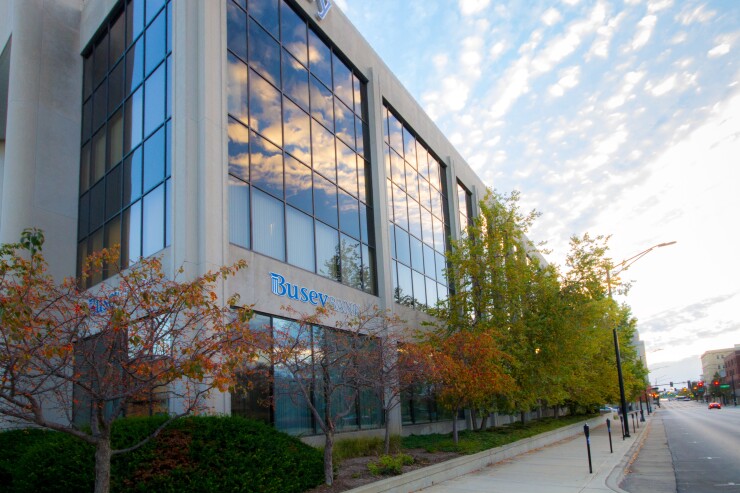
Merchants and Manufacturers Bank had a certain business line that made it an appealing takeover target to First Busey Corp. The seller's 20-year-old life insurance lending business was a "key driver in our decisioning," Van Dukeman, chairman, president and CEO of First Busey, said Tuesday.
First Busey
Merchants and Manufacturers' life equity loan program offers a revolving line of credit secured by the cash value of borrowers' life insurance policies. It generates good risk-adjusted returns but few, if any, credit headaches, First Busey executives said. Indeed, since introducing life equity loans in 2003, Merchants and Manufacturers has experienced zero losses on the product.
"It's incredibly secure," said Jeff Jones, First Busey's chief financial officer. "Besides cash collateral, you've got highly rated insurance companies standing behind these policies, the likes of Northwestern Mutual and MassMutual."
"It's a line of business we like," Dukeman added. "You can kind of think of it as a home equity line of credit, except it's secured by cash."

Given its solid fundamentals, life insurance lending is a crowded field, with dozens of banks, nonbank lenders and insurance companies offering competing products. Dukeman credited Merchants and Manufacturers' success to the ties it has forged with insurance agents around the country who make the life equity loans available to their policyholders.
"The team at Merchants and Manufacturers has done a really good job developing relationships," Dukeman said.
Maybe too good a job if such a thing is possible. Merchants and Manufacturers has been forced to sell a significant amount of its production from the business line in recent years, as the program's growth has outstripped balance-sheet capacity, according to Jones. "They're really kind of tapped out from a capital and a liquidity perspective," Jones said. That's the gas-and-oxygen mix they need to continue growing the business."
At $473 million of assets, Merchants and Manufacturers is just a fraction of the size of the First Busey, which has $12.3 billion of assets. This extra heft should help support additional lending through the life insurance business line.
"We can alleviate those concerns for them," Jones added.
First Busey, corporate parent of Busey Bank, has some experience with life insurance lending. According to Dukeman, it has purchased these types of loans originated by another lender. More importantly, in 2021, it acquired the $1.5 billion-asset Cummins-American Corp., the holding company for Glenview State Bank. Cummins-American had been buying loans from Merchants and Manufacturers, "so we got quite a bit of exposure," Dukeman said.
Merchants and Manufacturers' life equity loan portfolio has grown at a 20% compound annual growth rate since the end of 2019, according to First Busey. It totaled $224 million, or 55% of the overall loan book, on Sept. 30. The company's profits have followed a similar trajectory, rising from $2.3 million in 2019 to $4.1 million in 2022. Through the first nine months of 2023, Merchants and Manufacturers reported earnings of $5.1 million, according to the Federal Deposit Insurance Corp.
Analyst Brian Martin, who covers First Busey for Janney Montgomery Scott, characterized the acquisition of Merchants and Manufacturers as a "positive" in a research note on Tuesday. In addition to bolstering First Busey's position in the giant Chicago metropolitan statistical area, it adds a scalable niche lending product, Martin wrote. Investors appeared to have put their stamp of approval on the transaction, with First Busey shares trading up more than 2% at $21.36 midday Tuesday.
Founded in 1969, Merchants and Manufacturers operates five branches in DuPage and Will counties, located immediately west of Chicago and Cook County. First Busey operates eight branches in Will and DuPage. It held about 1.4% of the combined $71 billion deposit market as of June 30. The merged company would have 13 branches and a 2% deposit share in Will and DuPage.
Median household income for both DuPage ($100,292) and Will ($95,751) is substantially higher than the national average of $69,021, according to the Census Bureau.
Besides adding the niche business line, Monday's deal "does help us in what we consider a very good market," Dukeman said.
The $41.6 million price tag amounts to 142% of Merchants and Manufacturers tangible book value, higher than the 2023 average of 129%, according to Seaport Research Partners Analyst Laurie Havener Hunsicker. For First Busey, the acquisition, expected to close in the second quarter of 2024, would generate 1.5% tangible book value dilution with a two-year earnback. Earnings-per-share accretion is projected to be 6% in 2025, the first full year of operations for the merged company.
Martin described the merger as "strategically compelling and financially attractive" in his research note.
Dukeman said he didn't anticipate any hurdles to closing on time given the transaction's relatively small scale and the solid credit quality metrics at both companies. First Busey reported nonperforming loans of $12 million, or 0.15% of its $7.9 billion-asset portfolio at Sept. 30. Merchants and Manufacturers reported zero nonperformers.
"It's relatively small without any significant kind of outlier businesses that are complicated," Dukeman said. "You wouldn't think it would take too long. We'll file our application and find out."






